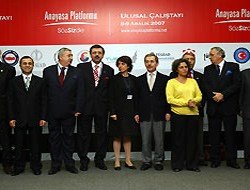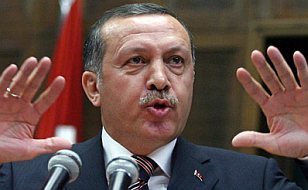The Dream of a Civil Constitution
"A new constitution must fully apply the unchanging Republican values of a democratic, laicist and social state ruled by law, must protect the rights of individuals in the most effective way, must protect the principles and standards of the Universal Declaration of Human Rights and the European Convention on Human Rights".
Prof. Dr. Zafer Üskül, a constitution expert who has transferred to the AKP, expressed the need for a new constitution in an interview in the "Radikal" newspaper:
"The current constitution cannot be ameliorated. The soul of that constitution [which was written by the military junta after the 1980 coup] cannot be destroyed. The soul of the coup is everywhere."
"The [new] constitution will be a "reconciliation constitution" with all political parties, and NGOs participating in the discussion."
This sounds nice, but is it practicable?
Pre-election party promises
Both the AKP and the Republican People's Party (CHP) are promising the strengthening of basic rights and freedoms in their pre-election memoranda.
The AKP says, "Applying a universal understanding of law and freedom, reformulated rights to life and property, and freedoms of thought, expression, belief, enterprise and organisation will be fully applied."
The CHP emphasizes that the right to life and freedom of expression are the basis of democracy and promises to protect the rights of the press and the freedom of communication to the last. The party says that it aims to develop basic rights such as "the rights of children, the right to work, trade union rights, the right to education, the right to shelter and accommodation, the right to an environment and urban rights" and overcome problems in their application.
Even the Nationalist Movement Party (MHP) speaks of the necessity of a new constitution and the protection of human rights. Ironically, its leader Devlet Bahceli feels no qualms about calling for a return of the death penalty at the same time.
The Democratic Party (DP, formerly the True Path Party) says that a general assembly throughout the country should prepare a civil constitution which respects human rights.
In theory, and in practice...
To be frank, all parties have caught on to the wisdom of speaking of human rights, but when it comes to practice, it is very different. A few points will suffice to show how little human rights are respected:
* The disgraceful Article 301 was ratified by the AKP. AKP's Minister of Justice Cemil Cicek has defended the article. When the AKP finally approached the CHP in order to change the article, CHP leader Deniz Baykal refused to cooperate. The worst is that although the EU is aware of Article 301, there are 14 other articles of the Penal Code which urgently need changing.
Legal amendments ratified in parliament under the leadership of the AKP have restricted the rights of defendants; the new Law on Terror openly invites torture and impunity, another amendment means that the police force has unprecedented authority.
* In order to decrease the chances of independent candidates to enter parliament, there was rarely-seen cooperation between the AKP and the CHP when they changed the format of the ballot paper. In addition, both AKP leader Erdogan and CHP leader Baykal called on people not to vote for independent candidates.
* When it comes to the right to organise, there has been no evidence of change in trade union law, or the laws on meeting and marching. On the contrary, the European Social Charter was only ratified with annotations.
* As far as the environment is concerned, this government's time in office has been characterised by an insistence on ignoring laws to protect the environment.
What kind of constitution can be designed by political parties who are competing in the accumulation of capital and in supporting the General Staff and American war policies?
Practical suggestions
While the political parties are making vague promises, which, looking at their track record, are not likely to be fulfilled after the elections, NGOs have long campaigned for concrete change in the constitution.
The Human Rights Association's General Committee, for instance, met in November 2006 and the then president Yusuf Alatas listed what was needed for a constitution based on social agreement, plurality, participation and human rights:
* The constitution must not allow for the violation of basic human rights in any case
* The duties and the limits of authority of the military must be made clear and be controlled by civil powers. Administration must be controlled by the judiciary. There must be an end to the division of the judiciary into civil and military.
* Parliament must represent the pluralist nature of society and this must be guaranteed by the constitution.
* Regional and local government must be strengthened and the constitution developed accordingly.
* Citizenship must be defined without applying ethnic terms
* Education in one's mother tongue must be accepted as a basic right. It must be possible for people to present and use public services in the language of the region.
* The constitution must be the basis on which independent human rights commissions, based on the Paris Principles, are formed.
* Equality of women, men and people with different sexual orientations must be safeguarded and the scope well-defined.
* Conscientious objection must be a basic right guaranteed by the constitution.
The Human Rights Association has called on parties to include the following in a new constitution:
Environmental rights, the right of benefiting from shared property, the right to development, the right to peace, the right to solidarity.
The right to peace in the constitution! Will they manage it? (TK/EÜ/AG)
KURDISH QUESTION
PKK Ceasefire to be Terminated on 31 October?

KCK CASE
Court Dismissed Request for Defence in Kurdish

7th Istanbul Gathering for Freedom of Thought

CONSTITUTIONAL AMENDMENTS
58 Percent Said "Yes" to Constitutional Reform Package

Rights Organizations 3 Years ahead of Foreign Minister













